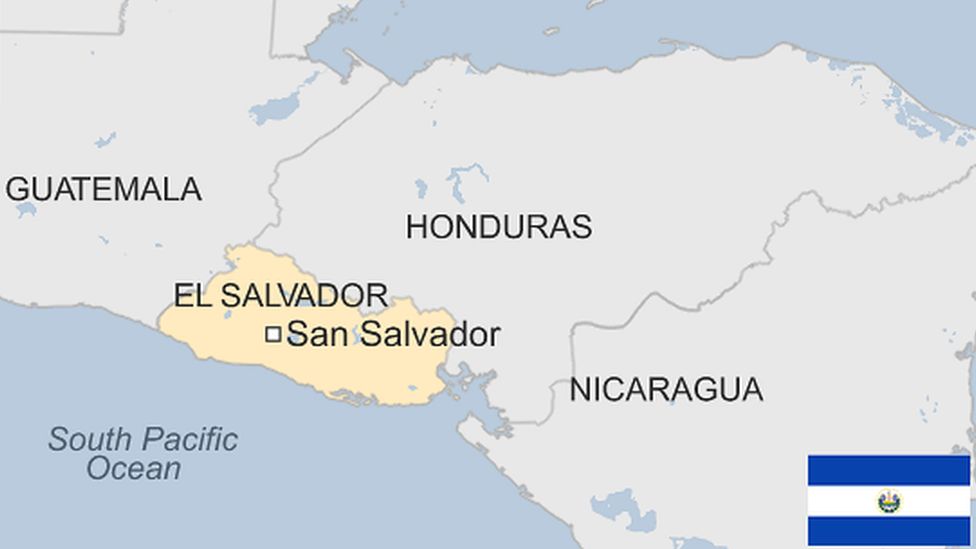El Salvador country profile
- Published

El Salvador, the most densely-populated state on the mainland of the Americas, is a small and highly-industrialised country.
In the 1980s, El Salvador was ravaged by a bitter civil war stoked by gross inequality between the overwhelming majority of the population and a small and wealthy elite that left around 70,000 people dead.
A UN-brokered peace agreement ended the civil war in 1992, ushering in important political reforms.
Until recently, the country had one of the world's highest murder rates, but under President Bukele there has been a crackdown on crime and gangs and El Salvador has been transformed from one of the most violent countries in the world to one of the safest in Latin America.
- Read more country profiles - Profiles by BBC Monitoring
EL SALVADOR: FACTS
- Capital: San Salvador
- Area: 21,041 sq km
- Population: 6.5 million
- Language: Spanish
- Life expectancy: 68 years (men) 78 years (women)
LEADER
President: Nayib Bukele
President Nayib Bukele was re-elected for a second term in February 2024. Preliminary results released after 70% of votes had been counted showed him winning with 83% of the votes.
His popularity has soared following a crackdown on crime which drove down the country's murder rate, from being one of Latin America's highest to one of its lowest.
Bukele's government carried out sweeping arrests of anyone suspected of being involved in gang activity during his first term in office.
Despite his popularity, Mr Bukele remains a controversial figure. Human rights groups say that thousands have been arbitrarily jailed during his anti-gang drive.
An estimated 75,000 people have been arrested under emergency measures that have been repeatedly extended.
A youthful political independent, Mr Bukele won the 2019 presidential election on a pledge to create a "new era" for El Salvador, take on gang violence and corruption, and foster better relations with the US.
His predecessor, Salvador Sánchez Cerén, had conducted a left-wing foreign policy and established diplomatic relations with China.
MEDIA
The media are among the victims of the widespread violence in El Salvador, says Reporters Without Borders.
Harassment and acts of violence in response to coverage of corruption and organized crime have often led journalists to engage in self-censorship, says Freedom House.
TIMELINE
Some key dates in the history of El Salvador:
c. 600AD - Lenca establish the first widely recognised civilization in what is now El Salvador. They develop links with Mayan settlements in neighbouring Honduras.
800 - Nahua-speaking Pipil occupy central and western regions. They called their territory Kuskatan, meaning "the place of precious jewels".
1521 - Smallpox epidemic sweeping across Central America - triggered by the arrival of European colonists in the region - drastically reduces the indigenous population.
1524 - Pedro de Alvarado, attempts initial Spanish conquest of the area, but withdraws after being defeated by the Pipil and their allies. It takes the Spanish some 15 years to finally crush indigenous resistance.
1821 - Independence from Spain.
1823-1840 - El Salvador forms part of the short-lived United Provinces of Central America, which also includes Costa Rica, Guatemala, Honduras and Nicaragua.
1859-63 - President Gerardo Barrios introduces coffee growing, which becomes the country's dominant crop.
1932 - Some 30,000 people are killed during the brutal suppression of a rural revolt known as La Matanza led by social activist and revolutionary leader Farabundo Martí.
1961 - Right-wing National Conciliation Party (PCN) comes to power after a military coup.
1969 - Week-long so-called "Football War" with Honduras leads to 4,000 deaths. Border tensions lead to conflict triggered when El Salvador meet Honduras for a three-round football elimination match preliminary to the World Cup. Up to 130,000 Salvadoran illegal immigrants are expelled from Honduras.
1979-1992 - Salvadoran Civil War. Up to 75,000 people are estimated by the UN to have died in the violence between army-backed right-wing death squads and left-wing Farabundo Martí National Liberation Front (FMLN) rebels.
1980 - Archbishop of San Salvador and human rights campaigner Oscar Romero assassinated;
1992 - Government and rebels sign the Chapultepec Peace Accords.
2002 - US court holds two retired, US-based Salvadoran army generals responsible for civil war atrocities, orders them to compensate victims who brought case.
2003 - El Salvador - along with Honduras, Nicaragua, Guatemala - agrees on a free-trade agreement with the US. The government ratifies the pact a year later.
2006 - El Salvador and neighbouring Honduras inaugurate their newly-defined border.
2009 - Former FMLN rebel movement emerges as largest party in parliamentary elections, and shortly afterwards former rebel Mauricio Funes wins presidential elections.
2012 - Human Rights Court for the Americas finds El Salvador guilty over the civil war massacre at El Mozote in 1981.
2012 - A year-long truce between street gangs. It reputedly saves the lives of thousands, but violence rises again in subsequent years.
2015 - Murdered Archbishop Oscar Romero is beatified, after Pope Francis approved his status as martyr.
2022 - Government launches a massive fight against criminal gangs and gang-related violence; declares state of emergency and arrests more than tens of thousands of suspected gang members.
Related Topics
- Published10 April 2023
- Published15 January
- Published31 March 2023
- Published4 April 2023
- Published31 March 2023